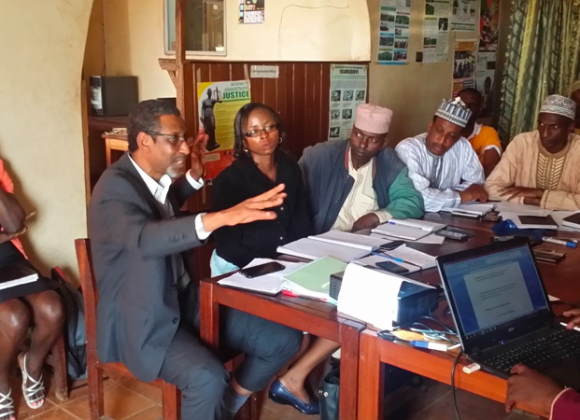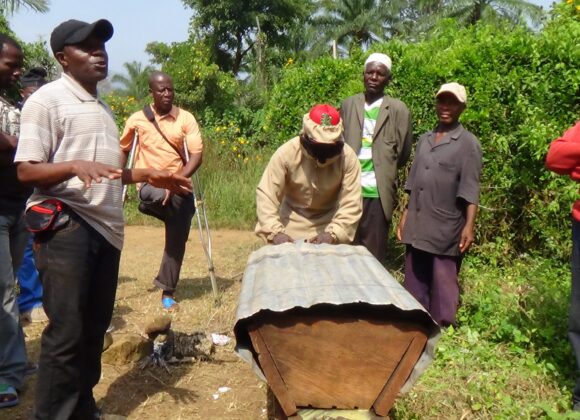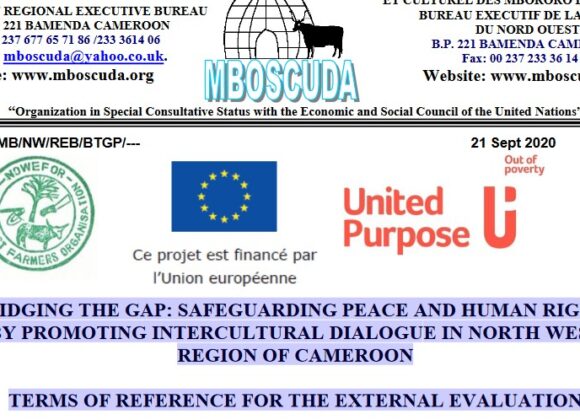Motto {Baldul}: Jangen, Demen e Duren (education, environmentally sustainable agriculture and cattle herding).

Conception
Just as it is a general role that almost everything must have a beginning, it is also true that if we put everything together, one idea brings us to the next. So the existence of the Mbororo Social, Cultural and Development Association of Cameroon – MBOSCUDA is, therefore, no accident.
Everything put together, it is the result of the efforts and hard work of some individuals to address and find possible solutions to the complex, if not, contradictory issue of “Social Development” in relation to the Mbororo Pastoralists within the framework of their own culture and lifestyle.
The idea of MBOSCUDA grew out of informal and largely unplanned discussions of some (mostly educated) Mbororo youths (mostly students) from different backgrounds who (perhaps inadvertently) set out to ask themselves what could be done with, what one of them then, rightly or wrongly called Mbororo Backwardness. (App.I). For most of them it was the question of asking oneself a number of questions. Who or what are we? Where do we come from? Where are we heading to? (App. V) If let alone what will become of us as a people, our cattle herding culture and pastoral way of life? What can be done to improve our lives? Answers to these questions are difficult. Perhaps, even impossible to find and it is not our purpose to discuss them here. But even a casual look at the realities convinced the youths on the need to do “something” about the situation. They also saw it as their responsibility to make this “something” possible (App. II). However, one major obstacle to any collective venture was the lack of contact between people resulting in a lack of knowledge about what others could be thinking or doing to help themselves. But this alone could not deter initiative. Without any knowledge about each other and without contact with one another a number of associative movements started up in different regions almost about the same time.
By 1987 one group that had started in Bamenda, (North West Province) met frequently (though informally) to exchange ideas and views. They formed the Fulani Social Development Association—FUSODA and wrote a number of papers (all unpublished), a Constitution and got themselves registered as a social gathering in the Sub-divisional Office of Bamenda. They also produce and issued out membership cards. This group had as major activity a savings and loans (njangi) venture and the Northwest Province as target area of operation. Among it’s most prominent animators were: Musa Usman Ndamba (as group leader), Ibrahim Haman, Usman Haman, and Nuhu Salihu (as secretaries), and Amina Haman (the lone female as Treasurer).
Another group started activities in Kumbo (still in the North West Province). They called themselves the Fulani Foundation of Cameroon—FUFOUCAM. They wrote to some people around the country, drew up a Constitution and published a paper: “The Fulani Foundation of Cameroon: Bridge to the Future” (App II) This group also went round consulting Mbororo people who could be interested in the idea. They had as major objective what they called “a collective fight for the economic, social and cultural liberation of the Fulani community”. FUFOCAM envisage the entire National territory of Cameroon as its target area of operation. It was lead by Nana Sarli Sardou, Yaya Umaru, Sali Usmanu and Gayeh Bakary.
A third group made up of University students, traders, government workers and professional drivers started in Yaounde (Center Province) in 1991. They formed the Mbororo Development Association—MDA, whose sole objective later became the creation of a single Mbororo organisation. Among its most prominent actors were Bouba Ndoudi, Suley Isa, Fadimatou Dahirou, Halidou Abdulaye, Amina Assabe, Hawe Bouba and Musa Madaki. And as if to confound conventional wisdom and tradition, it was headed by a woman—Hawe Haman. Unlike the first two groups in the North West Province, this group comprised people from different provinces or regions of the country, some of whom had affiliation to the first two groups. This posed a problem and as one guy (Bouba Ndoudi) was quick to point out:
We are not settled in one region of the country, neither do we have contact with others in other regions. So what kind of development are we talking about—of regions or of a people?
Join Us
Welcome to MBOSCUDA
Welcome to the Community. We have been existing since 1992.

Latest News




